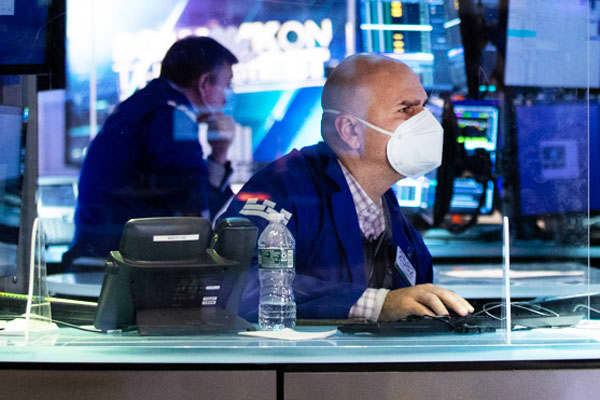Nasdaq drops 1% as rebound in tech stocks loses steam

U.S. stocks were little changed on Thursday morning as Wall Street attempted to build on a rebound from a rough start to the new year.
The Dow Jones Industrial Average rose 211 points, or 0.6%. The S&P 500 was flat, while the Nasdaq Composite dipped about 0.5%. The Nasdaq is currently on a three-day positive streak.
The markets were supported by some strong earnings reports. Delta Air Lines posted a beat on profit and revenue and reaffirmed full-year guidance, sending its shares up 3.6%. Shares of homebuilder KB Home rallied more than 13% after reporting better-than-expected earnings.
Elsewhere, Dow component Boeing rose nearly 4% following a Bloomberg News report that the company’s 737 Max could resume service in China as soon as this month. Payments stocks also moved higher, with Mastercard and Visa adding roughly 2%.
Weakness in Big Tech stocks, including Amazon and Tesla, weighed on the Nasdaq. Shares of Snap dropped more than 6%, while Virgin Galactic slid nearly 16% after the space exploration company announced a debt offering.
Thursday’s market moves came as another inflation report showed a historically high rise in prices but was not as bad as some economists feared. The December producer price index rose 0.2% month over month. That was below the 0.4% expected by economists surveyed by Dow Jones. However, the measure was up 9.7% year over year, which is the highest on record going back to 2010.
That report follows Wednesday’s December consumer price index, a key inflation measure, which increased 7% year over year, according to the department’s Bureau of Labor Statistics. That was the highest annual reading since 1982, but the report was largely in line with expectations.
Despite those readings, stocks have gained this week while interest rates have dipped, partially unwinding sharp moves in the opposite directions last week.
“We expect the US 10-year yield to move from the current 1.73% to around 2% over the coming months, as investors digest the Fed’s more hawkish stance along with further elevated inflation readings. That said, we don’t expect a sharp rise in yields that will imperil the equity rally. Year-over-year inflation is still likely to peak in the first quarter and recede over the year,” UBS strategists led by senior economist Brian Rose said in a note.
On Wednesday, The Dow Jones Industrial Average rose about 38 points and the S&P 500 added 0.3%. The Nasdaq Composite gained for the third straight day, climbing 0.2%.
“Stocks shook off the sticker shock of the historically high inflation number, but that was also widely expected and incredibly a non-event today really,” said Ryan Detrick of LPL Financial. “What we are excited about is earnings season is right around the corner. We expect another solid showing by corporate America, while it will also be a chance to stop focusing so much on the Fed and policy, but instead get under the hood and see how the economy is really doing.”
Elsewhere, initial jobless claims for the week ending Jan. 8 came in at 230,000, above the 200,000 projected by economists polled by Dow Jones forecast. However, continuing claims declined.
Markets also will be watching action on Capitol Hill, where Fed Governor Lael Brainard will be heading for her confirmation as vice chairman of the central bank’s policymaking Federal Open Market Committee.
Fourth-quarter earnings season kicks off this week with several major banks reporting on Friday before the bell. Analysts expect fourth-quarter earnings to be up 22.4%, according to Refinitiv, but guidance for 2022 from companies will likely be a key determinant for market action.
For the week, the S&P 500 and Nasdaq are up 1.2% and 2%, respectively, while the Dow is up about 200 points.




